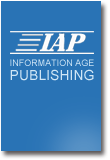
Embracing Artificial Intelligence in the Classroom
Edited by:
Elodie Jones, Fort Hays State University
Betsy Crawford, Fort Hays State University
Matthew Clay, Fort Hays State University
A volume in the series: Teaching and Learning Online. Editor(s): Franklin S. Allaire, University of Houston-Downtown. Jennifer E. Killham, University of La Verne.
Call for Abstracts
BACKGROUND:Teaching and Learning Online: Embracing Artificial Intelligence in the Classroom will be guided by two primary questions. First, how can educators explore, utilize, and embrace artificial intelligence as a tool to plan, design, and modify instructional practice that is meaningful and relevant for learners? Secondarily, how do educators navigate the ethical and moral use of artificial intelligence in teaching practice and policy?
Embracing Artificial Intelligence in the Classroom provides theoretical frameworks and practical AI applications to inform and prepare educators as AI advances and evolves. Today’s educators must prepare students for a future of innovation framed by the enduring constructs of critical thinking, problem-solving, and a growth mindset, which are integral skills regardless of technical advances. How will educators find a balance between AI technology and traditional approaches? Moreover, where will educators locate professional development, guidance, and resources on AI use in their classrooms?
Proposals should fall into one of the following categories:
• Frameworks
This section will consist of traditional chapters that are either conceptual or research-focused. Chapters must situate AI and practices/perspectives discussed within existing literature in curriculum, educational technology, pedagogy, and other relevant fields. Despite being traditional chapters, the aim is for contributions within this section not to be too ‘research-y’ and should be accessible to a broad audience, including practitioners. Potential audiences to keep in mind are pre-service and in-service teachers.
• Teacher Journeys
This section will focus on the lived experiences of educators as they interact with and utilize AI within their practice. Although relevant literature is encouraged, the chapters should not utilize excessive citations. The Teacher Journey’s chapters intend to serve as models for educators to focus on how to face, educate, experiment with, and/or implement AI within their practice.
• Applications (accommodations, classroom usage, etc.)
This section will consist of chapters demonstrating the utilization of AI in educational settings. The focus should be on the process in terms of instructional planning. In particular, submissions are encouraged that address how AI can be utilized as a tool to promote educational equity for marginalized populations of students. Submissions are encouraged not to place excessive emphasis on the ‘how to’ of particular AI tools but instead on the classroom application, intentionality, operationalization of tools, curricular modification and creation, and other elements of educational practice.
Interested authors should submit an abstract of 500 to 1,000 words describing their proposed manuscript by May 31, 2024.
Editors will review and invite selected authors to submit full manuscripts for possible inclusion in the final book. All manuscript submissions will go through peer review and must meet publication standards. An invitation to submit a full manuscript is not a guarantee of acceptance.
The Teaching and Learning Online Series is published by IAP and edited by Franklin S. Allaire (University of Houston-Downtown) and Jennifer E. Killham (University of La Verne). If you have questions about the series or would like to propose a future volume, please send an email to teachingandlearningonlinebook@gmail.com.
CONTENTS




